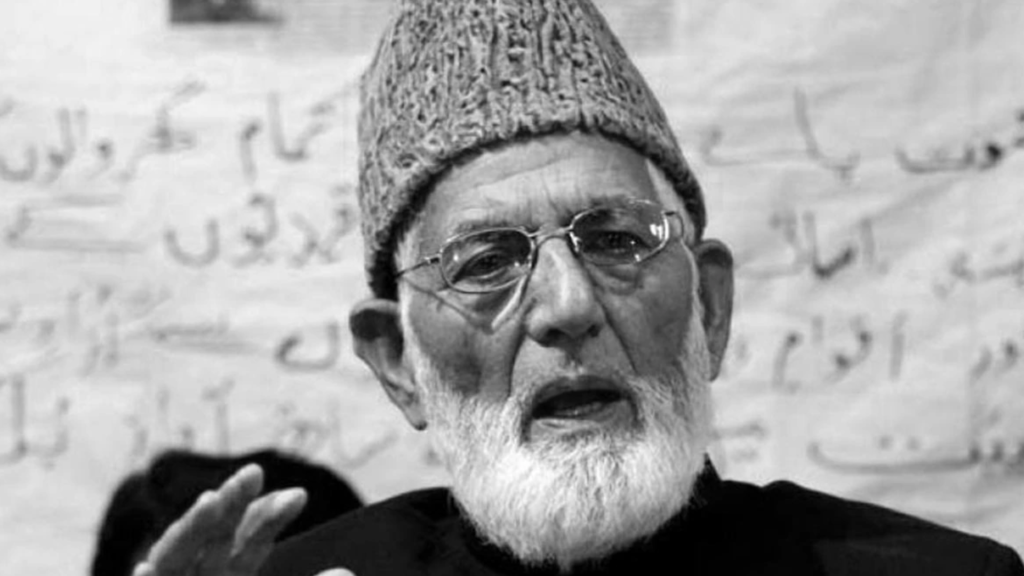
Remembering the Rehbar-e-Inqilaab: The Great Syed Ali Shah Geelani
Idrees Bhat
On September 1, 2024, we mark the third death anniversary of Syed Ali Shah Geelani, a figure who stands as a towering presence in Kashmir’s modern history, rivaling Sheikh Abdullah in terms of popularity and reverence. While Sheikh Abdullah was once a “popular” leader, Geelani’s legacy has arguably eclipsed his, especially when viewed through the lens of integrity, justice, and political struggle.
To many Kashmiris, Syed Ali Shah Geelani was not just a leader; he was a father (“Babb”) or beloved (“Toath”), with the latter term particularly used in his native place, Dooru, Sopore. Unlike Sheikh Abdullah, who is often criticized for using his influence to secure power, Syed Ali Geelani remained steadfast in his principles, never seeking personal gain. When he recognized that electoral politics were failing to serve the interests of the Kashmiri people, he chose a different path of resistance against Indian occupation, one marked by resilience, sacrifice, and a relentless pursuit of freedom.
Indian state with its auxiliaries in Kashmir, since past many decades, have run a smear campaign against the character of Syed Ali Geelani. However, Kashmiris very well knew what he stood for and why the occupier was so desperate to label him and construct different malicious narratives to defame him among his own people. Not just Kashmiris, Syed Ali Geelani was admired by his opponents and enemies for the character and integrity that he had.
Syed Geelani continued to fight for the cause of his people with great clarity and dedication. He never compromised on his principles no matter the situation. He rejected directives from Pakistan’s rulers, including the powerful military general Pervez Musharraf, and paid a heavy price for his defiance. Geelani was sidelined, stripped of his membership in the Organization of Islamic Cooperation (OIC) and replaced by Mirwaiz Umar Farooq. Yet, instead of bowing to pressure, Geelani continued to offer Pakistan his advice on domestic and foreign policy, asserting his independence as a leader.
Geelani’s stature transcended borders. He was, in essence, an ideological giant, arguably second only to Muhammad Ali Jinnah in the history of Pakistan. Many people in Kashmir and Pakistan consider him as the “Ideological father of Pakistan”. His vision extended beyond Kashmir and Pakistan; he was pro-Afghanistan, pro-Iran, pro-Saudi Arabia, pro-Turkey, and, above all, pro-Muslim Ummah. Geelani believed in the concept of one Ummah and rejected the narrow confines of territorial nationalism based on race, ethnicity, or language. For him, Pakistan’s role in Kashmir was vital, not because of geographical proximity, but because it was born in the name of Islam and has a historical stake in the Kashmir conflict. For any Kashmiri seeking a unified Ummah, the path naturally led through Pakistan.
Some young Kashmiris may wonder how Syed Geelani, with his global outlook, remained a staunch guardian of Kashmiri identity and rights. Syed Geelani himself answered this through his beliefs and actions. He drew inspiration from Islamic history, where conquered or ruled territories maintained their traditions and cultures, except those that violated fundamental Islamic principles. This respect for cultural diversity is evident in how different the Muslims of Malaysia and Indonesia are from those of Arabia and Kashmir. Geelani’s approach was straightforward: Kashmiri Muslims, as the primary victims of Indian oppression, should be the ones leading the resistance and deciding its course. They should be at the forefront, with Pakistan’s role being one of support, militarily, politically, diplomatically, and morally. He firmly rejected any dictation or interference from Pakistani leadership, including the jihadi factions.
While Syed Geelani remained steadfast till his last breath, his death gave birth to a new era where betrayals run supreme. It is heartbreaking to witness how some who once stood as champions of freedom, resistance, and religion have crumbled under the pressure of the state. Their resilience, once admired, deflated after just a few months or years of imprisonment. In stark contrast, Geelani and his close associate, Muhammad Ashraf Sehrai, led the movement with unwavering courage, even as their lives and families were under constant threat. Both men ultimately died under imprisonment, an active form of resistance.
Kashmiris revered Geelani and elevated him to the status of the tallest leader, not because of his name, caste or ideology, but because of his unshakable commitment to the people’s movement. He protected this cause with his life, made immense sacrifices, gave hope to the oppressed, led from the front, and shook the mighty Indian state. Those who deviate from this path of righteousness, who abandon the cause of freedom, should be rejected. The legacy of Geelani demands nothing less than total devotion to the struggle for freedom. Any compromise is a betrayal, and those who falter must be cast aside, for the cause is greater than any individual or party.
Geelani’s vision is now clearer than ever and resonates far and wide across the hearts of Kashmiri Muslims. Even those who once opposed him now concede that Geelani could foresee the grim future awaiting his people. His words and speeches have become a staple on social media, touching countless lives and reminding people of the leader they deeply miss.
Syed Ali Geelani predicted what many deemed impossible at the time a scenario where the Indian state would push for the ethnic cleansing and systematic extermination of Kashmiri Muslims. His predictions came at a time when there was no sign of the BJP’s rise to power. Yet, Geelani understood that it didn’t matter which party controlled the center. For him, the Indian state would never tolerate a Muslim-majority region near its borders, regardless of which political party was in power. This stood in stark contrast to India’s national interests as perceived by its ruling class.
Syed Ali Geelani compared the Congress Party to a tortoise, slow but steady in its approach, while the BJP moved like a rabbit, swiftly implementing its agenda. The depth of Geelani’s understanding of the situation was so profound that those opposed to him did everything in their power to undermine his leadership within his organization. They infiltrated his ranks, corrupted those around him, and launched campaigns to discredit him. In this betrayal, there was only one man who stood steadfastly by Geelani’s side-Muhammad Ashraf Sehrai, a symbol of resistance, sacrifice, and integrity.
After Geelani’s death, the occupiers may have felt a sense of relief, believing that a formidable obstacle in their path had finally been removed. Yet, their relief is tempered by a lingering fear, a fear of the legacy Geelani left behind, embodied in the devoted cadre, disciples, and countless admirers who continue to carry his torch. This is why the state launched a relentless campaign against them, jailing, killing, harassing, and silencing hundreds. But deep down, they know that Geelani’s legacy has been forged like a brick in the kiln, hardened by the fires of resistance and sacrifice.
The occupiers understand that their attempts to silence us are temporary at best. They know they cannot extinguish the flame of freedom that Geelani ignited. We will march forward with the flag of freedom held high. We are committed to taking his movement to its logical conclusion and offer everything we have, our lives, our children, our wealth to achieve this goal. There is no turning back from Geelani’s cause, no matter how our allies behave. Our loyalty lies not with any state, but with the martyrs and their graves. Their sacrifices have bound us to this path, and we will honor their memory by seeing this struggle through to the end. The cause of freedom is our only destination, and we will reach it, no matter the cost.
To conclude, I urge every admirer of Geelani, those who remember him on his anniversary and throughout the year, to pay true tribute to his legacy by walking in his footsteps. The greatest honor we can offer is to remain steadfast on the path he set for us, to uphold the promises we made to him. We must continue to fight for our dignity and freedom with every breath, pressing forward with all forms of resistance, including armed struggle, to expel the occupiers from our land. And let us never forget, we still have a journey to make to his grave. We still owe these two great men a funeral.



